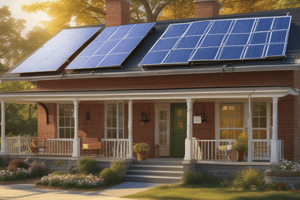Podcast
Questions and Answers
What is the primary focus of the section on 'Hazards Identification'?
What is the primary focus of the section on 'Hazards Identification'?
- Assessing the risks associated with various jobsite conditions (correct)
- Establishing general jobsite safety procedures
- Identifying the tools required for installation
- Listing specific warning signs for PV systems
Which of the following measures is NOT included in safety for electric shocks?
Which of the following measures is NOT included in safety for electric shocks?
- User training programs (correct)
- Earthing
- Insulated tools
- Testing for voltage
What does the 'Personal Fall Arrest System' primarily aim to prevent?
What does the 'Personal Fall Arrest System' primarily aim to prevent?
- Cuts and bites from tools
- Falls from heights (correct)
- Damage from arc flashes
- Injury from electric shocks
In terms of ladder safety, which factor is crucial when selecting the correct ladder for a job?
In terms of ladder safety, which factor is crucial when selecting the correct ladder for a job?
Which additional risk involves injuries due to extreme temperature changes?
Which additional risk involves injuries due to extreme temperature changes?
What is a recommended safety precaution to mitigate risks from lightning effects?
What is a recommended safety precaution to mitigate risks from lightning effects?
What type of system is referred to in the context of fall prevention that does not allow any fall to occur?
What type of system is referred to in the context of fall prevention that does not allow any fall to occur?
Which is an essential component of safety during operations and maintenance?
Which is an essential component of safety during operations and maintenance?
Flashcards
Solar PV System Installation Safety
Solar PV System Installation Safety
Procedures and precautions to prevent accidents during solar panel system installation.
Electric Shock Hazards (PV)
Electric Shock Hazards (PV)
Risks of electric shocks due to high voltage and electrical components in PV systems.
Fall Prevention in PV Installation
Fall Prevention in PV Installation
Measures to prevent falls from heights during solar panel system setup.
Safe Ladder Use in PV
Safe Ladder Use in PV
Signup and view all the flashcards
Fall Prevention Measures- PV
Fall Prevention Measures- PV
Signup and view all the flashcards
Arc Flash & Burn Risks- PV
Arc Flash & Burn Risks- PV
Signup and view all the flashcards
Risk Probability & Impact in PV Installation
Risk Probability & Impact in PV Installation
Signup and view all the flashcards
Jobsite safety Protocols (PV)
Jobsite safety Protocols (PV)
Signup and view all the flashcards
Study Notes
PW-PWR/G2: Safety Related to Solar PV System Installation
- Purpose: Provide safety recommendations for installing PV systems, protecting workers, owners, and others on the installation site.
- Scope: Focuses on hazards specific to solar PV systems, particularly those installed on buildings. Addresses height and fire hazards. Prescriptions apply to building-related systems, but can also be used for ground-mounted systems.
Abbreviations, Definitions, and Key References
- A comprehensive list of abbreviations and definitions are provided, including terms like AC (alternating current), DC (direct current), GHI (global horizontal irradiance), LV (low voltage), MV (medium voltage), etc. Detailed descriptions of each term are also included.
Hazards Identification
- Specific Reference Documents: Highlights relevant documents, such as Health and Safety Executive (HSE) guides on construction safety.
- Overview: Analyses hazards from a general perspective, covering installer, inspector, and maintenance roles. Certified personnel are required for safe system design and construction.
- Risk Analysis:
- Identification and Tools: Emphasizes conducting a Preliminary Hazard Analysis (PHA) to assess hazards, impacts, and safety risks.
- Risk Probability and Impact Assessment: Explains using a Probability and Impact Matrix (PIM) for evaluating risk levels. Risk is calculated as Probability multiplied by Impact.
- Personnel: Highlights the role of designated personnel to oversee the correct prevention plan execution. The roles, responsibilities, and procedures are explained well.
Electric Shocks
- Specific Reference Documents: Lists relevant documents for this chapter—particularly, Health and Safety Executive (HSE).
- Overview: Focuses on DC (Direct Current) shocks from photovoltaic components, contrasting this with AC (Alternating Current) systems. Emphasizes safety precautions for electrical live parts. It discusses varying levels of voltage and their associated risks.
- Safety Measures: Discusses preventative measures, such as grounding electrical systems, using insulated tools. and correct voltage testing. High voltage situations require special attention.
Risk of Falls
- Specific Reference Documents: Includes relevant HSE documents on construction and roof work.
- Main Topics: Falls are a significant hazard in PV installations. The text emphasizes the need for thorough hazard identification across all working environments.
- Ladders: Discusses proper selection and use of ladders for safe work, emphasizing safe access points, clear operating procedures, and using the correct ladder type for the specific task.
- Fall Protection: Explains the use of personal fall-arrest systems, fall-restraint systems, guardrail systems, and warning lines for preventing falls, highlighting the importance of inspection and maintenance.
Additional Risks
- Specific Reference Documents: References HSE documents on construction hazards.
- Overview: Outlines different hazards, such as arc flashes, burns, exposure, bites, and cuts, and falling modules (including shatter risk), all part of a holistic safety evaluation. Discusses preventive treatments for injuries.
Safety During O&M
- Specific Reference Documents: Lists HSE guides related to construction.
- Safety in O&M: Covers operational and maintenance duties for photovoltaic (PV) systems. Emphasis is placed on monitoring electrical production, performing inspections, and checking components' performance.
- Recommendations: Offers suggestions for training and qualification of O&M personnel to ensure all workers have the skills to perform safety procedures.
Companion Documents
- Includes information about various documents. Lists referenced material such as technical specifications, guidelines, etc.
ANNEX A: Summary of Recommendations
- Conventional Hazards: Provides guidelines for safety practices in construction.
- Arc Flashes and Burns: Outlines steps to avoid arc flash hazards.
- Testing for Voltage: Provides instructions on how to test voltage safely.
- Insulated Tools: Explains the use of insulated tools when working with electrical systems.
- Marking and Warning Signs: Focuses on identifying safety signs for clear communication in both English and Arabic.
ANNEX B: Examples of Warning Signs
- The appendix displays and explains examples of warning signs in English and Arabic. Includes graphical depictions and corresponding text descriptions. A wide range of warning signs are given, including warning symbols, phrases, and a summary of recommendations to implement for safety during installation.
Studying That Suits You
Use AI to generate personalized quizzes and flashcards to suit your learning preferences.




